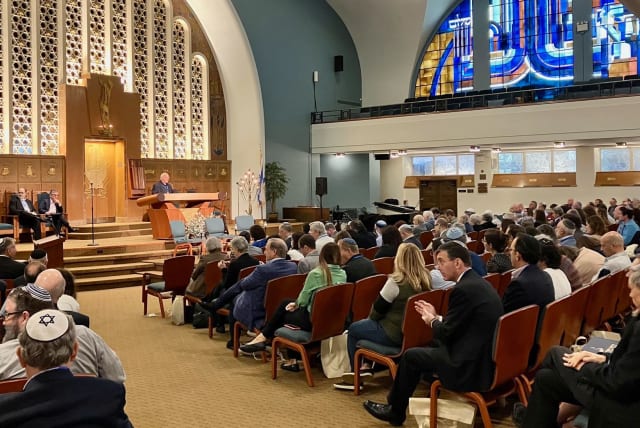Rabbi Ammiel Hirsch: ‘We are losing the soul of the Reform movement’

"To turn against Israel is a sign of Jewish illness," Hirsch said Wednesday.
Rabbi Ammiel Hirsch, senior rabbi of the Stephen Wise Free Synagogue in Manhattan, spoke at the “Re-CHARGING Reform Judaism” conference on Wednesday. The conference, which was initiated by Hirsch, who has been considered by some as the “opposition” in the American Reform Movement (the Union of Reform Judaism – URJ), in terms of its relationship with Zionism, Israel and with tradition.
In his speech, Rabbi Hirsch expressed his concern that the North American Reform movement is at an inflection point in its history. He said that fears that if the movement becomes perceived as anti-Zionist and anti-particularistic, most American Jews will abandon it. He stated: “If the North American Reform movement, in word or in deed, by action or silence, becomes, in fact, or even in perception, an anti-Zionist, anti-particularistic movement that cares only, or mostly, about universal concerns, unanchored in, and unmoored from, the centrality of Jewish peoplehood, most American Jews will abandon us.”
Hirsch said he believes that fundamental and rapid changes are unfolding that will challenge the vitality and well-being of the movement. He emphasized that he is referring to the collective efforts of the entire Reform movement when he speaks of its outcomes: “When I refer to the Reform movement, I do not mean any one of us separately; I mean all of us together. Outcomes are the product of our collective and cumulative efforts.”
“I fear that we are losing the soul of the Reform movement. But the process of distancing from Israel was gathering strength for many years before this government came into existence.”
Hirsch stated that critiquing decision-makers is a sign of health and vitality in the Jewish community. However, turning "against Israel; to join our ideological opponents and political enemies in castigating Zionism, is a sign of Jewish illness.”
Given the growing hostility to Israel in liberal and progressive circles, Hirsch shared that he believes it is not enough for leaders to proclaim their Zionist bona fides occasionally. Instead, they must be proactive and lead: “We are the leaders. We must lead. We must be proactive.”
Growing fissures within the Reform movement
Hirsch also addressed the growing fissures within the Reform movement itself. He said that he believes that these rifts must be attended to rather than ignored for the sake of a false sense of unity: “And sooner or later we will have to attend to the growing fissures in the Reform movement itself. We cannot pretend they do not exist for the sake of a false sense of unity.” Otherwise, he fears that the rifts between anti-peoplehood, anti-Zionist Reform Jews and Zionists committed to Jewish particularism will reopen with devastating consequences.
He concluded by stating that "Judaism absent Jewish peoplehood is not Judaism; it is something else.” Separation from the Land of Israel was never considered permanent in Jewish history: “At no time in the history of our people was separation from the Land of Israel considered permanent.” Hirsch added that it is "inconceivable," to imagine North American Reform Judaism without what has been built in Israel over the past fifty years.
Jerusalem Post Store
`; document.getElementById("linkPremium").innerHTML = cont; var divWithLink = document.getElementById("premium-link"); if (divWithLink !== null && divWithLink !== 'undefined') { divWithLink.style.border = "solid 1px #cb0f3e"; divWithLink.style.textAlign = "center"; divWithLink.style.marginBottom = "15px"; divWithLink.style.marginTop = "15px"; divWithLink.style.width = "100%"; divWithLink.style.backgroundColor = "#122952"; divWithLink.style.color = "#ffffff"; divWithLink.style.lineHeight = "1.5"; } } (function (v, i) { });
